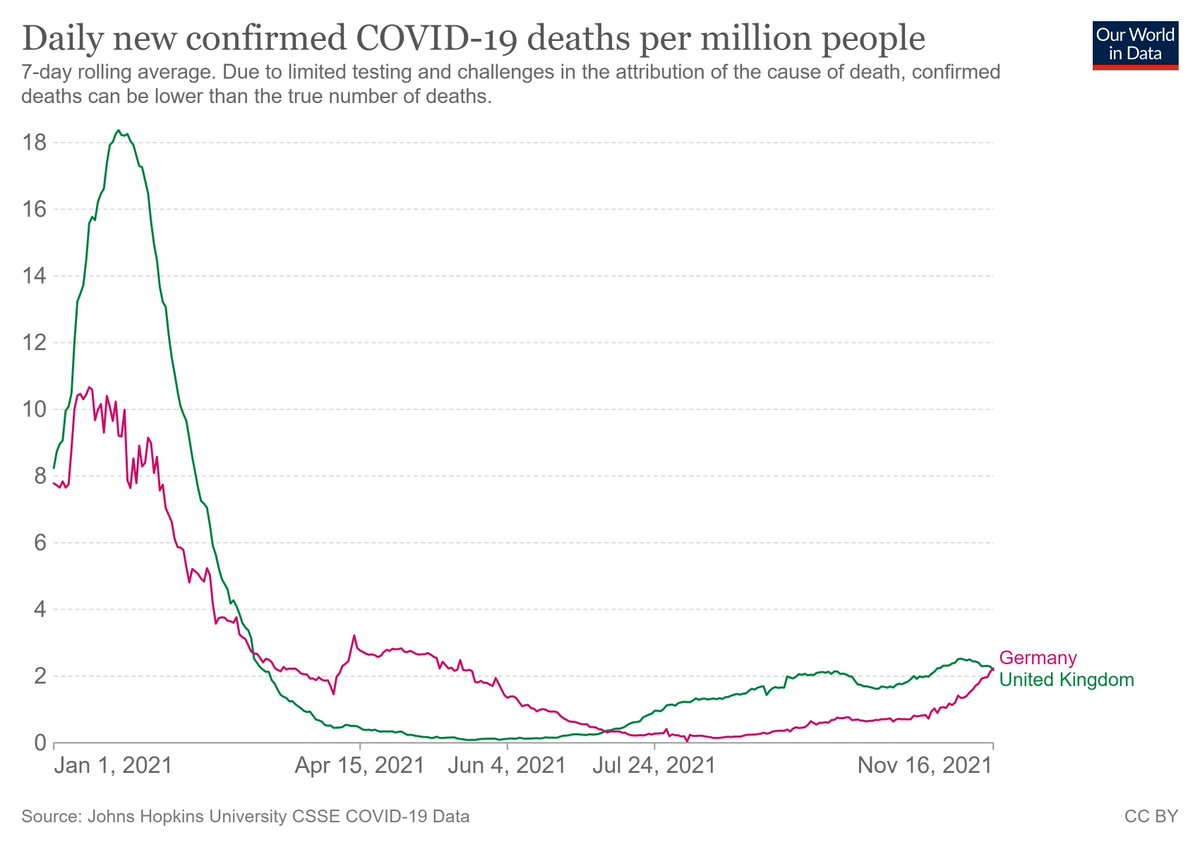
As lockdowns/restrictions come in across Europe and SAGE present their latest scenarios, calls are inevitably rising for more restrictions/lockdown in England too.
A thread on what we know so far, what is likely to happen and whether further restrictions now are justified:
1/n
A thread on what we know so far, what is likely to happen and whether further restrictions now are justified:
1/n
1st, my aim in writing this is the same as it has been throughout pandemic: to contribute to the public debate on how to achieve what I believe should be the objective of all policies: to reduce overall health harm from Covid - and the response to it - in the short & long term.
That has led me to support restrictions/lockdowns at some times - & oppose them at others - depending on the epidemiological picture with Covid, the situation in the NHS & the impact of restrictions in enabling a reduction in overall health harm based on likely costs & benefits.
2nd, of course I don't have access to any recent unpublished data which advisers/policy makers may have so I am presenting what I believe is a plausible scenario based on the published data and models (which @GrahamMedley always rightly reminds us are scenarios not predictions)
Those models have given us a very wide range of scenarios e.g. 600 - 6000 daily deaths / 2500 - 25000 admissions which happens due to the very large uncertainties on some key parameters (esp. Omicron severity/vaccine effectiveness (VE) for hospitalisation and death) which
obviously makes policy making v. difficult. Whether we are facing a much worse situation than last Winter's alpha wave (which required a lockdown) or recent delta wave (which we managed without restrictions since July) makes a huge difference to the appropriate policy response.
But we have to make a judgement now as to which of those scenarios is most likely to occur so this is my attempt - not based on any new models but on what has happened here before in England and the data we have so far on Omicron from South Africa and here.
The key metrics we need to predict are daily admissions/total no. of patients & deaths and how high they will go depends on:
1. daily & total no. of cases
2. the case-hospitalisation rate, case-ICU rate and Case-Fatality rate (which depends on severity & VE)
3. length of stay
1. daily & total no. of cases
2. the case-hospitalisation rate, case-ICU rate and Case-Fatality rate (which depends on severity & VE)
3. length of stay
Which are still uncertain but we have some idea from Gauteng, SA where cases appear to have peaked earlier than expected and hospital admissions and death are also lower than in the delta wave so although it's still too early to be certain, data is pointing towards less severity 

Whether lower severity seen is intrinsic to Omicron ( plausible based on two lab studies
https://twitter.com/jburnmurdoch/status/1471954637221683202) or due to higher immunity is important but countries with similar levels of immunity to SA (whether from vaccines or natural infection) should have similar outcomes.
And England's immunity is likely to be higher than SA
as we have also had very high Delta exposure over the last 6 months in younger ages (at least 10 million infections, 85% in under 50s) combined with high booster rates in older ages (>80% in over 50s)
mrc-bsu.cam.ac.uk/now-casting/
as we have also had very high Delta exposure over the last 6 months in younger ages (at least 10 million infections, 85% in under 50s) combined with high booster rates in older ages (>80% in over 50s)
mrc-bsu.cam.ac.uk/now-casting/
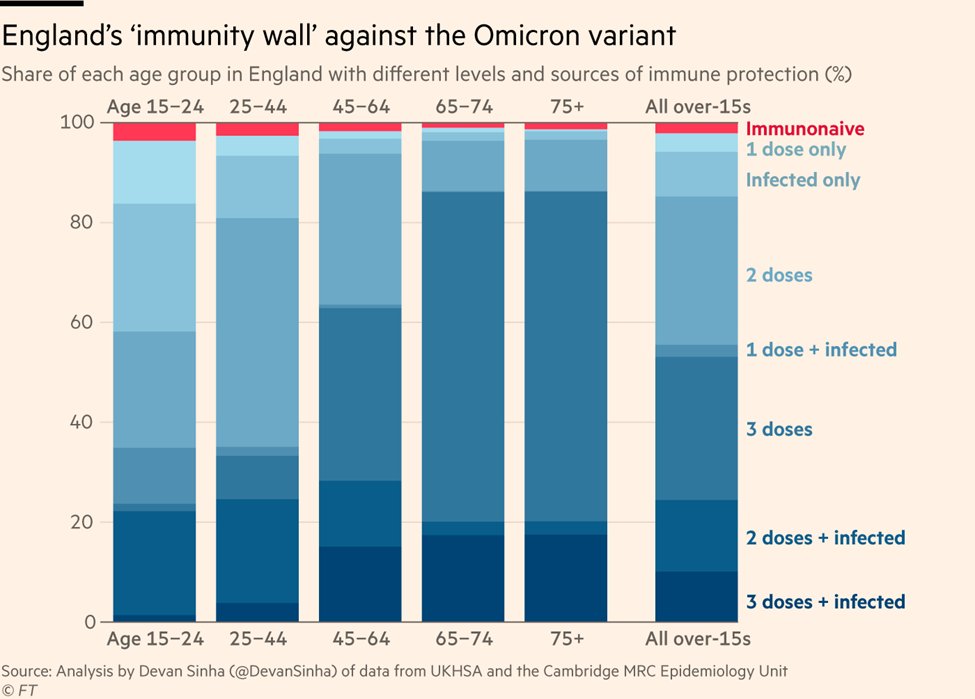
Going back to the models, in general, actual outcomes have been much better than worst case scenarios & have been closer to the best case scenarios (certainly for delta wave where there was also huge uncertainty when they were produced ) as shown here:
data.spectator.co.uk/category/sage-…
data.spectator.co.uk/category/sage-…
This is one example where the LSHTM's most optimistic scenario in response to lifting restrictions on July 19th was close to the actual outcome (which I think does help illustrate the value of models - provided we also learn from experience.) 
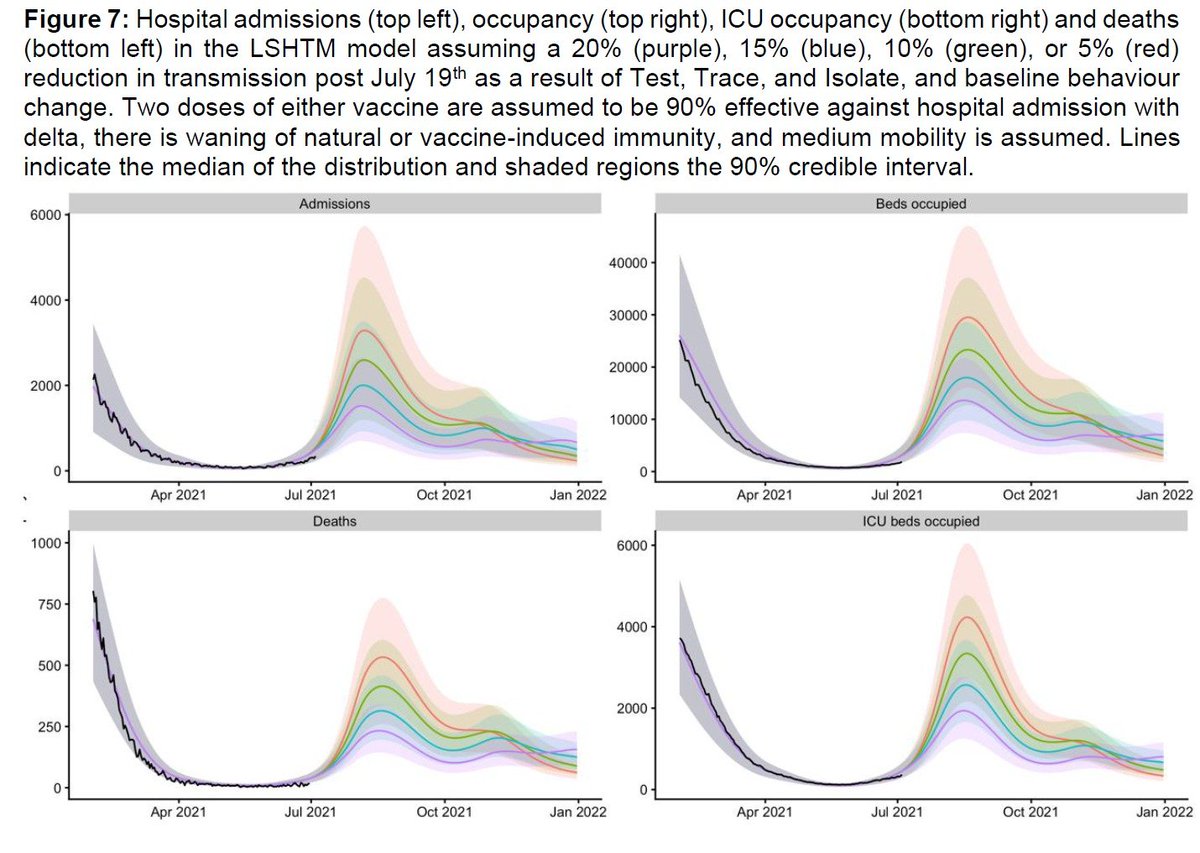
This may be because models don't factor in impact of people’s behaviour change in response to rising cases/admissions/deaths i.e. the 'voluntary lockdown' we are seeing now (& which may already be having an impact in London)
& have seen in previous waves:
https://twitter.com/alexselby1770/status/1472989741150879750
& have seen in previous waves:

The current LSHTM model which I think is most helpful shows 4 main scenarios :


https://twitter.com/BarnardResearch/status/1469646833563615237
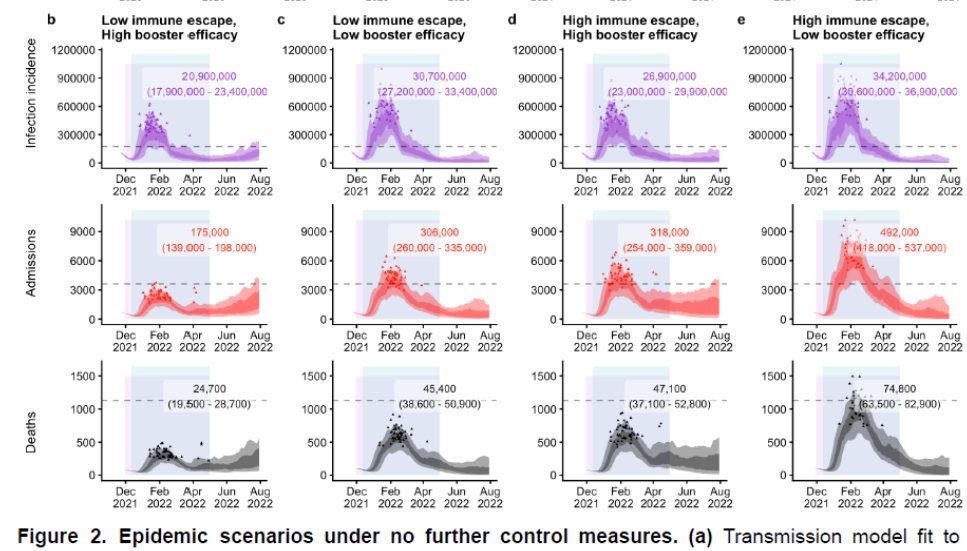
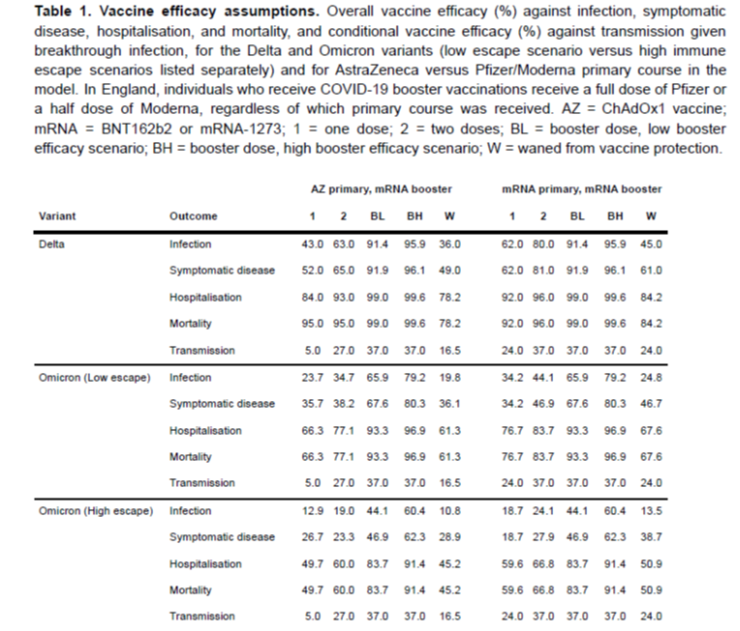
Based on VE data so far: 70-75% for symptomatic infection with 3 doses in UK & 70% for hospitalisations for 2 doses in SA: (70% overall but higher in <50s & lower in >50s which is good for UK where most >50s have had 3 doses) I think we can exclude the most pessimistic scenario. 

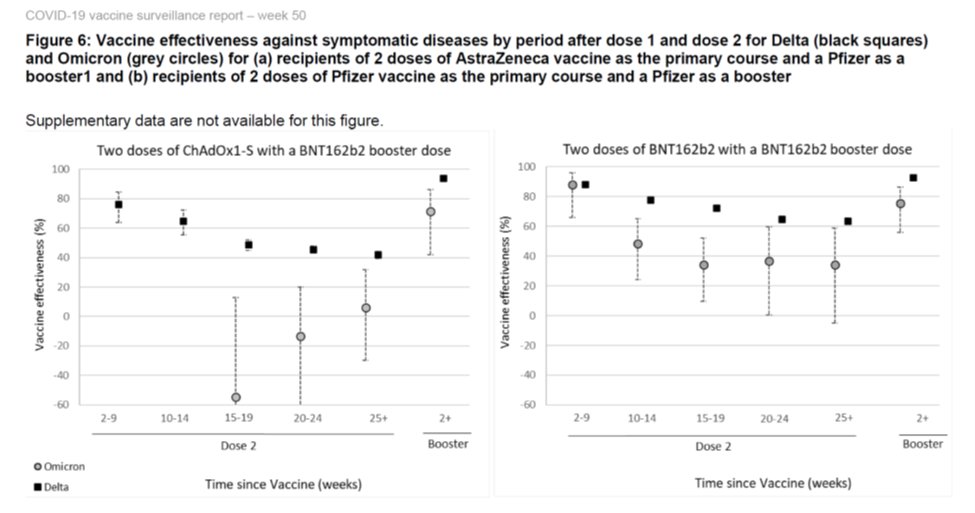
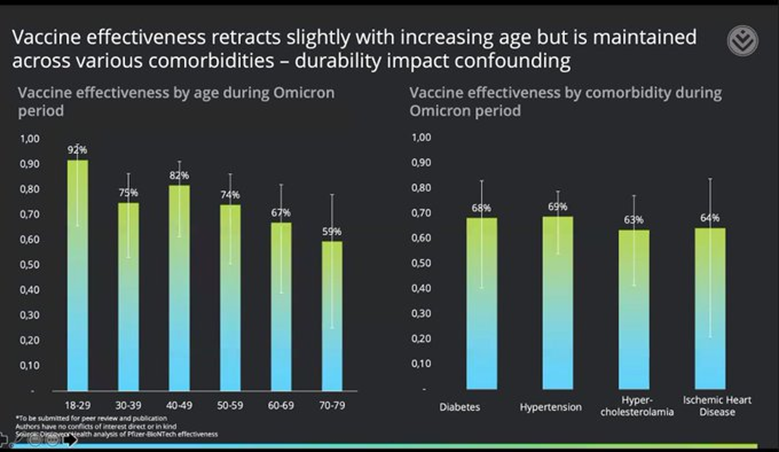
So based on this data we are currently between LSHTM middle & optimistic scenarios & as this model doesn't factor in reactive behaviour change, I think its reasonable to say optimistic one is more likely so hospitalisations would be below last Winter's peak and deaths much lower
On case-hospitalisation rates, data from London is not as bad as feared from raw Covid +ve figures as the % of patients where it is not primary diagnosis is higher than with Delta and based on those admitted for Covid is currently tracking the Delta wave:

https://twitter.com/drraghibali/status/1472134530173702145
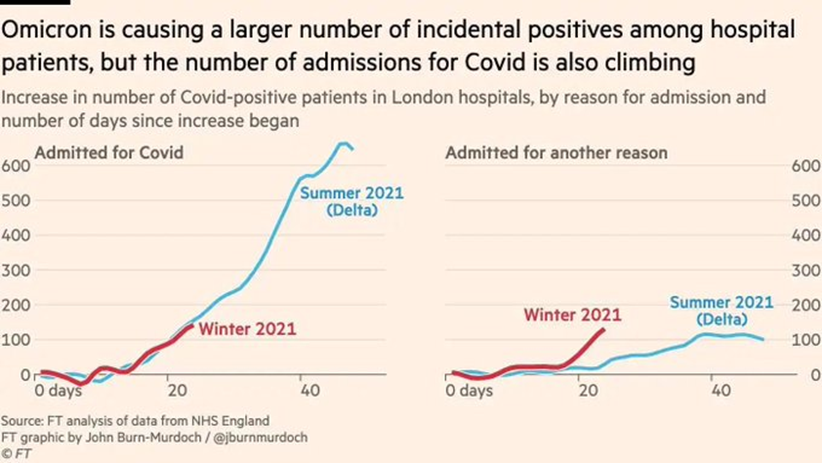
But we do need to try to flatten the peak (as we successfully did with Delta without restrictions - despite all the dire predictions) both to spread out admissions to reduce acute NHS pressures and to reduce high staff absences we now have so we can keep all NHS services running.
So do we need restrictions now? Given that we will have a much better idea of the case-hospitalisation rate (CHR) in a few days and what I've said above, I think we can wait for this before pre-emptive action. But isn't it always better to bring in restrictions sooner than later?
That's true if it's clear they will be required (as it was for Alpha wave as CHR was known) but for Omicron it's unknown & could be lower than Delta & as restrictions have costs too, bringing them in prematurely is harmful if they turn out not to be needed- as we saw with Delta.
And it's also only true if people are willing/able to follow restrictions which again is uncertain based on polling figures & what people actually did before e.g. household mixing was more influenced by the level of risk than rules in place at the time.


https://twitter.com/drraghibali/status/1472107337796177924
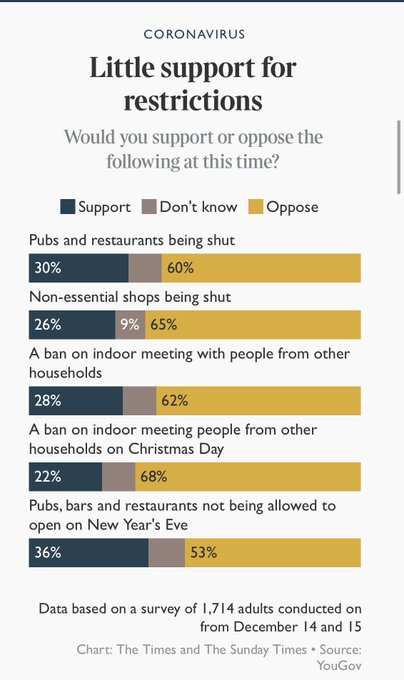
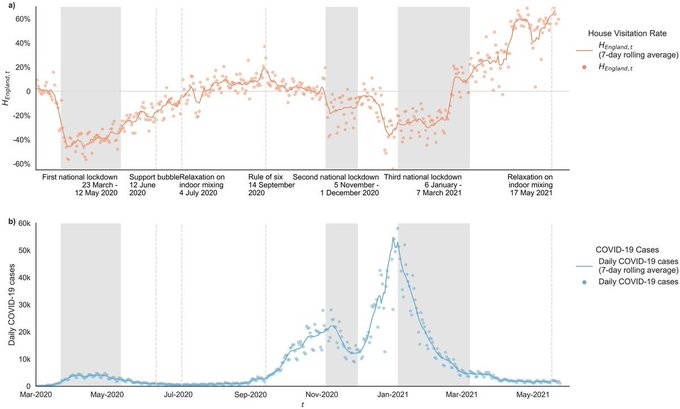
So it's not clear that the assumption that mandatory restrictions will reduce Covid transmission more than the 'voluntary lockdown'/behaviour changes we now see is correct & it could lead to the worst of both worlds - i.e. harms of restrictions without reducing spread of Covid.
So I think the focus going forward should continue to be on clear public health guidance on how to reduce spread, providing resources to improve ventilation/air filtration in schools, workplaces, etc. & support for businesses which are being affected by the 'voluntary lockdown.'
Finally all of us can help in getting through this wave & to be able to enjoy Christmas safely with our families – by getting boosted; following the public health guidance from @CMO_England & by supporting each other in coming weeks to ensure that no-one is left to face it alone.
• • •
Missing some Tweet in this thread? You can try to
force a refresh







